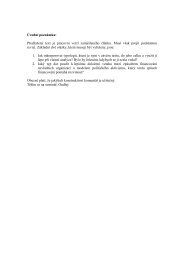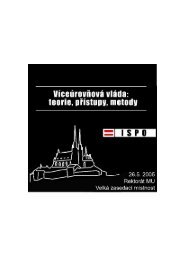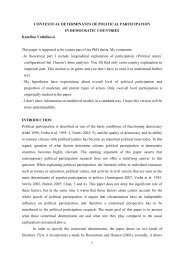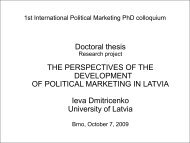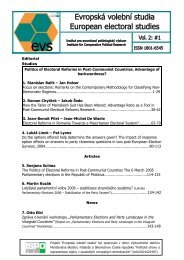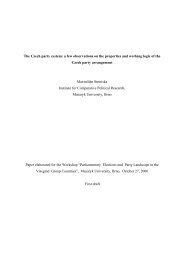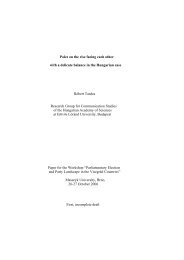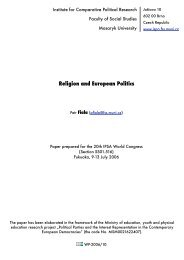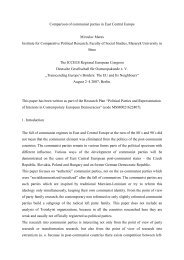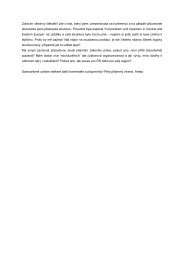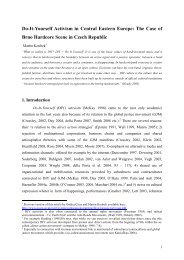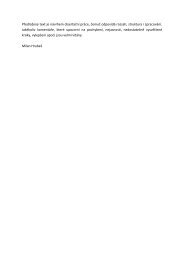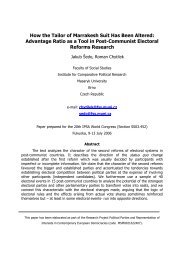Agrarian and Peasant Parties in the Czech Republic - Masarykova ...
Agrarian and Peasant Parties in the Czech Republic - Masarykova ...
Agrarian and Peasant Parties in the Czech Republic - Masarykova ...
Create successful ePaper yourself
Turn your PDF publications into a flip-book with our unique Google optimized e-Paper software.
In Slovakia <strong>the</strong> agrarian partisanship has a mostly similar tradition as <strong>in</strong> <strong>the</strong> <strong>Czech</strong> <strong>Republic</strong>. As<br />
mentioned above, <strong>the</strong> <strong>Republic</strong>an Party of Farmers <strong>and</strong> <strong>Peasant</strong>s <strong>in</strong> <strong>the</strong> <strong>in</strong>terwar period acted as a<br />
common <strong>Czech</strong>o-Slovak party. Also after <strong>the</strong> fall of communism <strong>the</strong> coalition Alliance of<br />
<strong>Peasant</strong>s <strong>and</strong> Countryside (Spojenectvo polnohospodárov a vidieka – SPV) had a federal basis <strong>in</strong> <strong>the</strong><br />
first free election <strong>in</strong> 1990, however, <strong>in</strong> Slovakia it received fewer votes than <strong>in</strong> <strong>the</strong> <strong>Czech</strong> <strong>Republic</strong><br />
– only 2,5%.<br />
In <strong>the</strong> first half of <strong>the</strong> 1990´s peasant parties managed to achieve relatively high electoral results,<br />
however, it is important to underst<strong>and</strong> it more as a result of successful electoral coalition tactics<br />
of <strong>the</strong> peasant representation than <strong>the</strong> electoral support of this type of parties. The <strong>Peasant</strong> Party<br />
of Slovakia (Rolnická strana Slovenska - RSS) <strong>and</strong> <strong>the</strong> Movement of <strong>Peasant</strong>s of Slovakia (Hnutie<br />
polnohospodárov Slovenska - HPS), which represented mostly <strong>the</strong> <strong>in</strong>terests of agricultural<br />
cooperatives (Hyn!ica 2006), established <strong>in</strong> 1992 an electoral coalition with <strong>the</strong> Social<br />
Democratic Party of Slovakia (SDSS). This coalition received 4% of votes <strong>in</strong> <strong>the</strong> Slovak National<br />
Council, 4,9% <strong>in</strong> <strong>the</strong> Chamber of People of <strong>the</strong> <strong>Czech</strong>oslovak Federal Assembly <strong>and</strong> 6,1% <strong>in</strong> <strong>the</strong><br />
Chamber of Nations of <strong>the</strong> <strong>Czech</strong>oslovak Federal Assembly.<br />
Two years later <strong>the</strong> <strong>Peasant</strong> Party of Slovakia was a marg<strong>in</strong>al electoral partner of <strong>the</strong> w<strong>in</strong>ner of<br />
this election – <strong>the</strong> centrist populist Movement for Democratic Slovakia (HZDS) headed by <strong>the</strong><br />
charismatic <strong>and</strong> authoritarian leader Vladimír Me!iar, which received 37,3% of votes. The RSS<br />
won 3 m<strong>and</strong>ates <strong>and</strong> it was a part of governmental coalition agreement. The RSS <strong>and</strong> <strong>the</strong> HPS<br />
merged later <strong>in</strong>to <strong>the</strong> New <strong>Agrarian</strong> Party (Nová agrárna strana – NAS). The NAS jo<strong>in</strong>ed <strong>the</strong><br />
HZDS before <strong>the</strong> 1998 election (Kope!ek 2002: 372). Therefore, <strong>the</strong> agrarian party family is not<br />
represented <strong>in</strong> contemporary Slovak party system (Kope!ek 2007: 482)<br />
The Democratic Farmers Party of Germany (Demokratische Bauernpartei Deutschl<strong>and</strong>s – DBD)<br />
existed dur<strong>in</strong>g <strong>the</strong> communist regime <strong>in</strong> <strong>the</strong> German Democratic <strong>Republic</strong>, where it was one of<br />
<strong>the</strong> so called “Blockparteien”. These were parties which were officially admissible by <strong>the</strong> regime<br />
<strong>in</strong> <strong>the</strong> Democratic Bloc. The DBD was founded <strong>in</strong> 1948 with <strong>the</strong> aim <strong>the</strong> get <strong>the</strong> farmers for <strong>the</strong><br />
idea of build<strong>in</strong>g of socialism ((Oberreuter, Kranenpohl, Olzog, Liese 2000: 241).<br />
After <strong>the</strong> fall of Berl<strong>in</strong> wall <strong>the</strong> party left <strong>the</strong> Democratic Bloc <strong>in</strong> December 1989 <strong>and</strong> attempted<br />
to act as an <strong>in</strong>dependent party <strong>in</strong> <strong>the</strong> democratic political system. However, <strong>the</strong> DBD did not<br />
have any partner <strong>in</strong> western Germany, which was very important for East German parties <strong>in</strong><br />
1990. The turn to <strong>the</strong> ecological issues was also not successful because this part of political<br />
spectrum was occupied by Greens. In <strong>the</strong> free election <strong>in</strong> March 1990 <strong>the</strong> DBD received only<br />
2,2% of votes. In September 1990 <strong>the</strong> party with 90.000 members merged with <strong>the</strong> Christian<br />
Democratic Union (Oberreuter, Kranenpohl, Olzog, Liese 2000: 241), which is one of <strong>the</strong> two<br />
12



